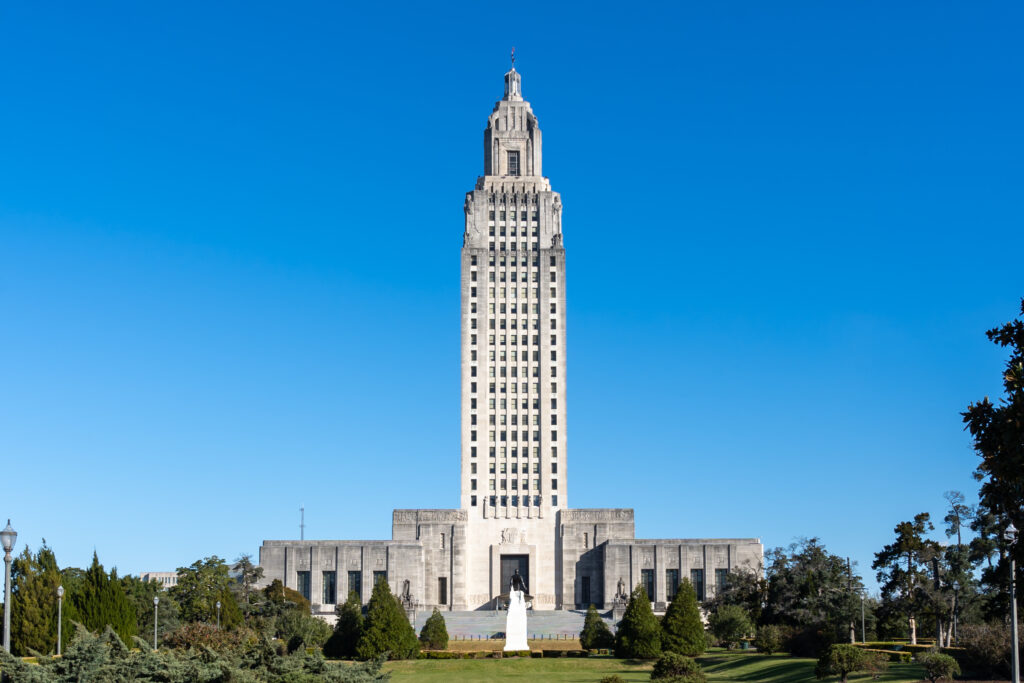Trump-Endorsed Attorney General Jeff Landry Wins Louisiana’s Gubernatorial Election
Washington, D.C. — On Saturday, Oct. 14, Louisiana Attorney General Jeff Landry (R) won the state’s election for governor, defeating a handful of other candidates. With 547,828 votes, Landry won the governorship through the support of only 18% of Louisiana’s registered voters. The outgoing Gov. John Bel Edwards (D) was term-limited and unable to run for re-election.

Under Louisiana’s open primary system, no partisan primaries are held. Instead, one “jungle primary” takes place, usually followed by a run-off general election between the two candidates receiving the most votes in the primary. Landry, however, unusually won more than 50% of the vote, meaning no general election will be held for this race.
Landry entered Election Day with an endorsement from former President Donald Trump as well as the support of Rep. Steve Scalise (R-La.), who has compared himself to former Ku Klux Klan leader David Duke and in 2002 spoke to Duke’s gathering of white-supremacist leaders.
Taking after Trump, the soon-to-be Louisiana governor has a history of undemocratic behavior. In 2020, as attorney general, he supported a post-election lawsuit led by Texas Attorney General Ken Paxton (R) that sought to overturn President Joe Biden’s election. The lawsuit was ultimately dismissed by the U.S. Supreme Court.
Currently, Landry is involved in two ongoing redistricting challenges in the state. Landry has most notably defended the state’s congressional map in a lawsuit challenging the map for diluting Black voting strength in violation of Section 2 of the Voting Rights Act (VRA). Plaintiffs in the case argue that Louisiana should have two Black-opportunity districts as opposed to just the one the state currently has, given the state’s 33% Black population that votes cohesively as a block. Landry, however, has argued the map does not violate Section 2 of the VRA.
After the U.S. Supreme Court unpaused a lower court order blocking the map, Landry continued to fight to suppress Black voters by successfully delaying the implementation of a fair congressional map when the 5th U.S. Circuit Court of Appeals canceled a lower court hearing related to drawing a new, compliant map.
Another ongoing lawsuit challenges the state’s legislative maps, arguing they too violate Section 2 of the VRA by diluting the voting strength of Black Louisiana voters. Trial in the case is slated to begin on Nov. 27. Landry has also defended the state against the lawsuit, arguing that plaintiffs in the case lack standing, meaning the right to relief in court.
The gubernatorial race was not the only contest on Saturday’s ballot. There were also four constitutional amendments for voters to consider, one of which was seeking to prohibit the private funding of election administration. In the low-turnout election, 73% of voters supported adding the following provision to the state constitution: “No funds, goods, or services donated by a foreign government or a nongovernmental source shall be used to conduct elections unless provided for in the election code and subject to restrictions provided by general law.” The passage of this amendment is part of a conspiracy theory-driven trend to ban the private funding of election administration.
In 2020, $350 million in grants were provided by private donors via Mark Zuckberg’s Center for Tech and Civic Life to local election officials in efforts to support the administration of elections amidst the deluge of necessary administrative changes wrought by the COVID-19 pandemic. Private funding has routinely been utilized to fill the gaps in chronically underfunded election offices across the country.
With this 2020 wave of grant money, an unfounded — and debunked — theory was developed, which alleges that the private grants provided an advantage to Democrats in the 2020 election. Despite the baseless nature of the concerns, however, 25 states have prohibited the private funding of elections in the last two years.
This constitutional amendment along with Landry’s move to the governor’s mansion ahead of 2024 will likely impact voters across the state. Advocates are particularly worried about the new funding restrictions without any promises from legislators to meet funding needs. As one Louisiana organizer explained, “This is worse than a solution in search of a problem. This is all about election administration and creating more limitations and barriers to voting,” citing that voters can expect longer lines and outdated equipment.
Learn more about Louisiana’s redistricting litigation here.
Read more about bans on private funding for election administration here.